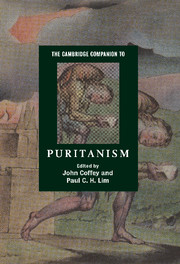5 - Later Stuart Puritanism
from Part I: - English Puritanism
Published online by Cambridge University Press: 28 November 2008
Summary
'The prophets don't live for ever!' warned Matthew Mead in his funeral sermon for the Puritan minister Timothy Cruso in November 1697. The old guard was passing. Already that winter the City of London had lost six Dissenting ministers. A distinct clerical generation was bowing out. Of seventy-eight Dissenting ministers pursuing their ministry in the capital in 1695, forty-three were 'Bartolomeans', Puritan ministers ejected from their parishes by the Act of Uniformity on St Bartholomew's Day 1662, and twenty-six of these ejected ministers would die before the century's end. The very last of the Bartolomeans, Nathan Denton, struggled on in Yorkshire, preaching where he could, and never repenting of his nonconformity until overtaken by death in 1720: to the end he was, in Edmund Calamy's words, 'the picture of an old Puritan'. In 1720 the Puritans were apparently a thing of the past. Even in 1680 Bunyan had felt the need to explain the label: 'the man was a godly old Puritan, for so the godly were called in times past'. In the later seventeenth century the term was acquiring an air of rather generalised piety. In 1688 Roger Morrice noted that the Princess of Orange had recommended the 'holy heavenly mortified life' practised by some 'very godly' Dutch Protestants, 'like the old Puritans in England . . . These keep communion in all public acts of worship . . . but go on Wednesdays to conventicles, private meetings for humiliation and fasting etc., where they rehearse the last sermon, confer upon some practical questions, or upon the catechism, pray and hear a sermon.' As an adjective, 'Puritan' was applicable to the 'more strict and sober' Muslims or Papists.
- Type
- Chapter
- Information
- The Cambridge Companion to Puritanism , pp. 89 - 106Publisher: Cambridge University PressPrint publication year: 2008



